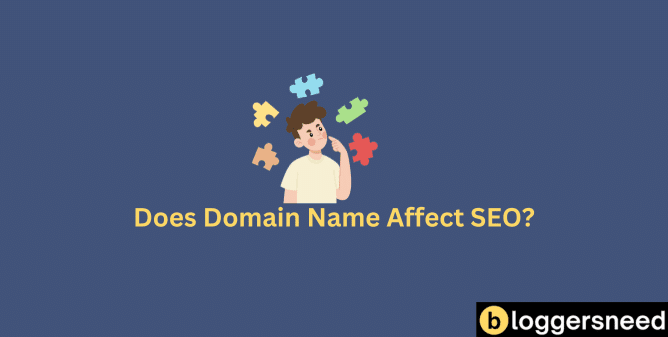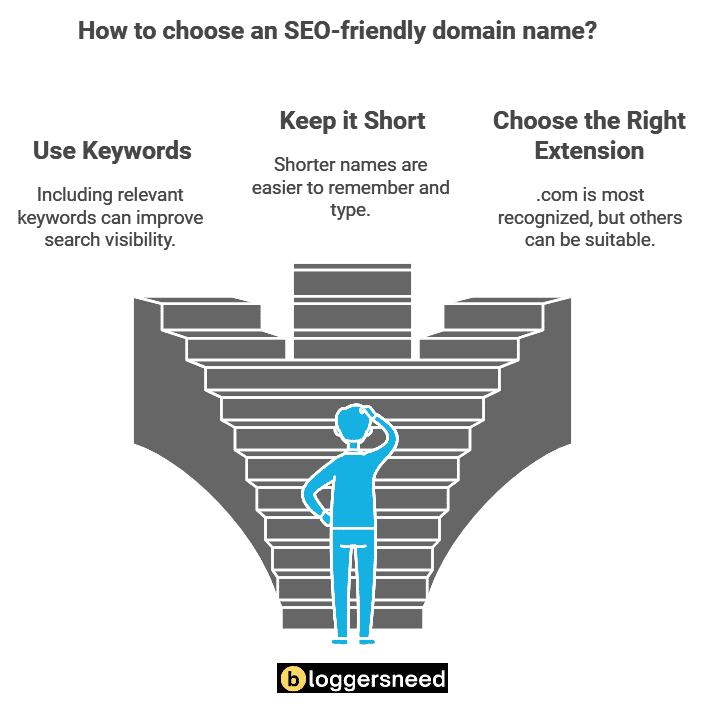
Your domain name can indirectly affect SEO by influencing user experience (UX), a direct SEO ranking factor. It helps users recognize your brand and business purpose, which is essential for building trust and improving click-through rates. A well-chosen domain name can also enhance your site’s visibility in search results by including relevant keywords and geographic targeting. However, exact-match domains are not always the best choice, as search engines discourage keyword-stuffing. Instead, focus on creating a memorable and branded domain name that complements your SEO efforts. To understand more about the nuances of domain names and SEO, explore the best practices and common mistakes to avoid.
Table of Contents
What is a Domain Name?
A domain name is fundamentally your website’s unique address on the internet. It’s what users type into their browsers to access your site, making it a vital element of your online presence.
When choosing a domain name, you’ll need to take into account several factors, including the type of domain (e.g., .com, .org, .net), the inclusion of relevant keywords, and the reflection of your brand identity.
The length of your domain name also matters; shorter names are generally easier to remember and type. Additionally, think about future scalability—will your domain name still be relevant as your business grows?
For instance, if your business is focused on a specific product or service, your domain name should clearly indicate this, such as “techgadgets.com” or “fashionstyles.net.”
How Do Domain Names Impact SEO?
When you choose a domain name, you’re not just picking a unique address for your website; you’re also making a decision that can influence your site’s visibility in search engine results.
A well-chosen domain name can enhance keyword relevance and brand identity. For example, having a domain name like “SydneyPhotography.com” can considerably improve your site’s visibility for searches related to photography in Sydney.
The domain length also matters, as shorter and more memorable names are easier for users to share and remember.
Geographic targeting and niche specificity can be achieved by including location-specific keywords or the name of your niche within the domain. This can make your site more recognizable and user-friendly, which indirectly supports your SEO efforts.
What are the Best Practices for Choosing an SEO-Friendly Domain Name?
To choose an SEO-friendly domain name, you should focus on simplicity and branding. This involves considering keyword relevance, brand identity, memorability factors, length considerations, and geographic targeting.
A simple domain name helps users remember and type it correctly, enhancing brand identity. Memorability factors include avoiding hyphens and numbers, as seen in examples like “Apple.com,” which is short and easy to pronounce.
Length considerations suggest keeping the domain name between 6-14 characters, similar to successful companies like Google and Amazon. Additionally, geographic targeting can be achieved with country-specific TLDs.

What Are the Common Mistakes to Avoid When Choosing a Domain Name for SEO?
Choosing a domain name for SEO involves avoiding several common pitfalls that can greatly impact your website’s visibility and user experience.
To start, make certain your domain name aligns with your brand identity and has keyword relevance to your content. Avoid lengthy domain names, as they can be difficult to remember and spell, potentially leading to typos and user frustration.
Using hyphens can also make your domain look less professional and may lead to trust issues. For local SEO, consider country-specific domain endings like .AU, .UK, or .NZ to signal your target audience.
Finally, check the registration history of your domain to avoid any negative associations.
How Does User Experience Affect Domain Name Selection?
When choosing a domain name, user experience plays a vital role. A well-chosen domain name can enhance user engagement by making your site easy to remember and access.
It also contributes to brand recognition, as a consistent and memorable domain name reinforces your brand identity. Make sure your domain name has keyword relevance to help users quickly understand the content of your site.
Trust signals, such as a ‘.com’ extension, can increase credibility. Furthermore, consider mobile optimization by avoiding hyphens and numbers, which can complicate typing on mobile devices.
How Does the Extension of a Domain Name Impact SEO Performance?
When choosing a domain name, you should consider how the domain extension impacts SEO performance. The top-level domain (TLD) such as .com, .org, or .net, and country code TLDs like .au, can influence user perception and credibility, which in turn affects SEO.
For instance, a .com domain is often viewed as more professional and can improve click-through rates, while a country-specific TLD can help target a local audience more effectively.
What Are the Frequently Asked Questions?
When considering the extension of a domain name, you might wonder if it impacts SEO performance.
The truth is, the top-level domain (TLD) such as .com, .net, or .org, does have an indirect effect on SEO.
For instance, using a more recognized TLD like .com can increase credibility and memorability, potentially improving user experience and, by extension, SEO efforts.
Are Shorter Domain Names Better?
Yes, shorter domain names are generally better because they are easier to remember, type, and share, which can enhance brand recognition and user engagement.
Does TLD Affect SEO?
The extension of a domain name, also known as the top-level domain (TLD), has long been debated for its impact on SEO performance.
While Google states that TLDs don’t directly affect search rankings, certain TLDs like .com are preferred for brand recognition and trust factors.
Keyword relevance and geographic targeting also play a role in TLD selection.
Does Domain Redirect Affect SEO?
Yes, changing your domain name can have a significant impact on your SEO performance, even if you set up redirects correctly.
Domain redirects can minimize traffic loss and preserve link equity if implemented properly. However, incorrect setup can lead to a drop in search rankings.
Using 301 redirects and updating internal links are essential steps to maintain SEO impact.
Does Using Expired Domains Boost SEO?
Yes, using expired domains can indeed boost SEO performance, but only under certain conditions.
When you purchase an expired domain, you inherit its established SEO value, including domain authority and backlink quality.
However, it’s essential to guarantee niche relevance and appropriate keyword usage to benefit from expired domain benefits.
This strategy can drive organic traffic and enhance your online visibility.
Affiliate Disclosure: Some of the links in this post are affiliate links, which means I may earn a small commission if you make a purchase through those links. This comes at no extra cost to you. Thank you for your support!
